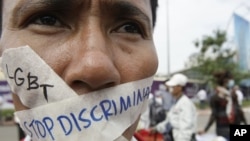The reach of a US Supreme Court decision in favor of same-sex marriage has been far, even in Cambodia, where the decision was much discussed over social media. That has given some in the country’s LGBT community hope, but it has also exposed divisions in this conservative culture, one that is unlikely to support a similar initiative any time soon.
“I support this revolution,” said Ean Vichet, who was born male but identifies as a woman. “I hope Cambodia will adopt this kind of law, so there will be no discrimination of same-sex couples.” Cambodia probably has a long way to go before it does so, he said. “Society is not open enough to accept this trend.”
Ean Vichet has behaved like a girl since he was young. For him, discrimination and bullying were the norm. Some people called him “gay,” and others called him “kteuy,” a slang word for the transgendered. He’s attracted to men, not women, he said, so he cannot be married here.
For Ean Vichet, and many like him, Cambodia’s strict culture leaves them little room, even though historic accounts from hundreds of years ago record transgendered men and women in the marketplaces of the ancient Chenla Kingdom. Today, though, their lives are difficult to understand.
Some, like Kim Kolveasna, a student at the University of Health and Science, say Cambodia should not follow the US’s decision on same-sex marriage. “I don’t think it is good for Cambodia to have this because our country is a developing country, so legalizing same sex marriage will result in declining the number of human resources,” he said.
But for activists like Porng Chanthorn, it was good news. “I believe they should have the same rights as normal couples to choose whomever they love to marry.”
Houn Sokuntheary, a university student, said the decision was good, allowing people to express their love openly and legally.
“Legalizing same-sex marriage means we respect their choice and also their rights,” she said. It allows people to “admit who they really are,” she said. “Sometimes they may hide it, because most people would not appreciate what they are doing.”




